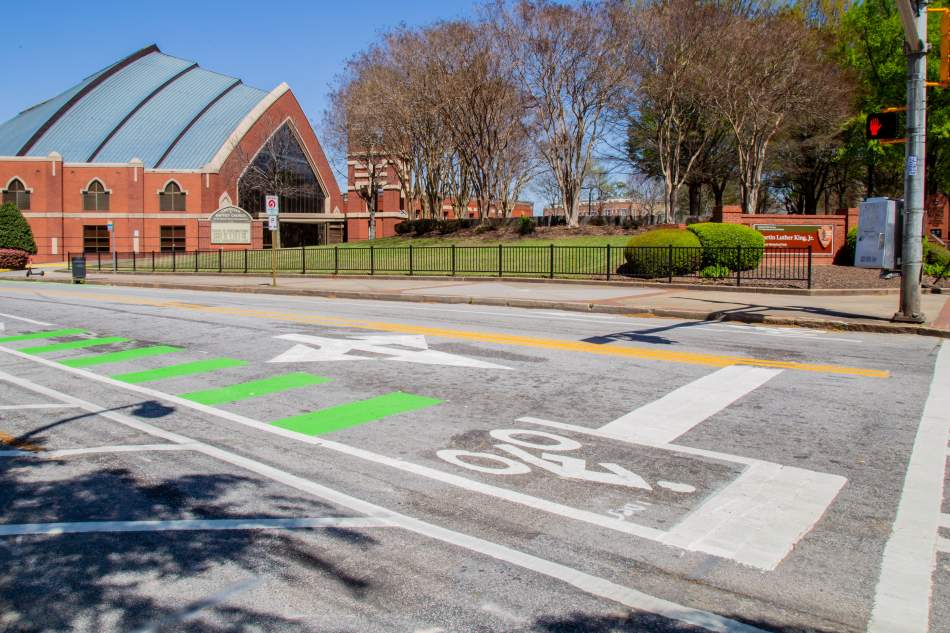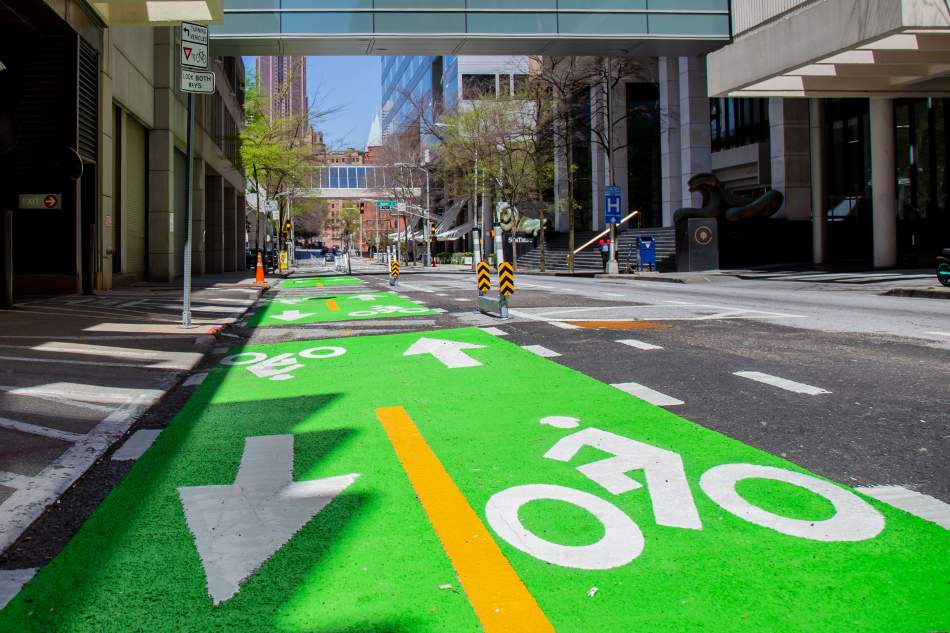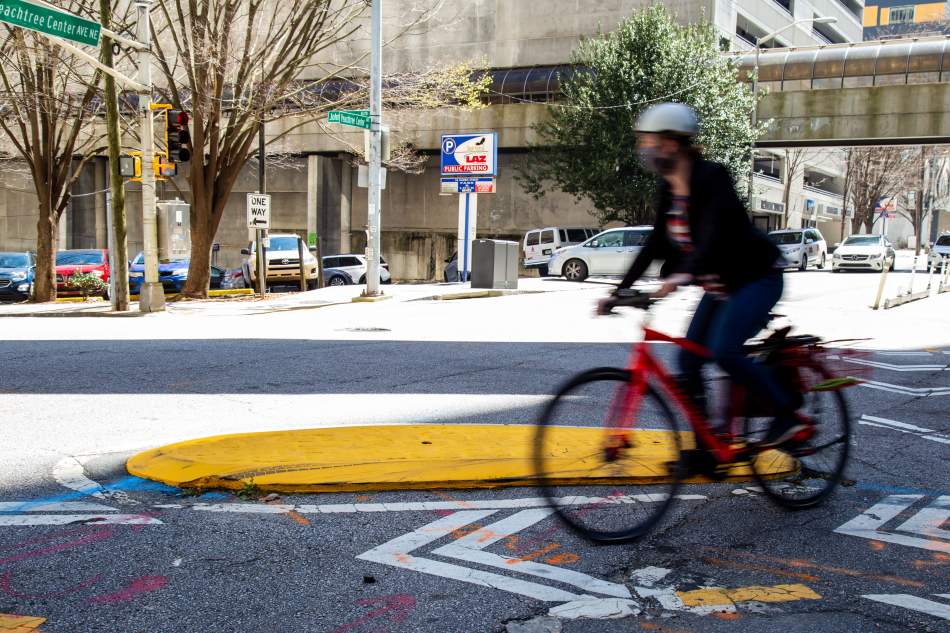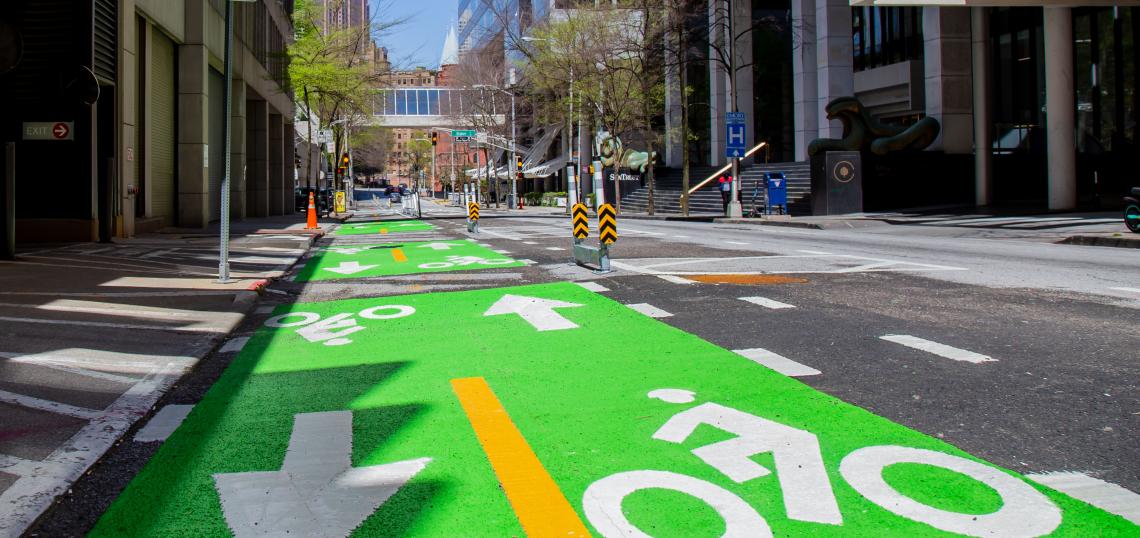It’s been a year since Atlanta City Councilmember Amir Farokhi’s grand idea to let ordinary citizens dictate infrastructure improvements began to take shape in the form of a solid project list.
The fruits of that labor—and so much community input—are beginning to ripen across downtown. And now Candler Park is on deck.
The pilot program uses an approach called participatory budgeting, or PB for short. In Atlanta, it all started when Farokhi, the District 2 representative, discovered about $1 million in unspent transportation infrastructure funding in his district’s coffers in 2018—and a lightbulb flicked on.
In late 2019, with the council’s backing, Farokhi launched a campaign called Downtown Decides that allowed his constituency—the people using downtown’s streets, sidewalks, and bike lanes on a daily basis—to pitch transportation projects deserving of the extra million bucks.
More than 3,000 Atlantans took part—enough for Farokhi’s office to call the program a “major success” during a ribbon-cutting tour of projects last week.
Seventeen projects were picked from a shortlist of 34, and so far, seven have wrapped. They range from the seemingly simple (additional trash and recycling receptacles on Edgewood Avenue) to more involved (a realignment of bike lanes on Peachtree Center Avenue to boost safety).
 Safety improvements recently implemented near Martin Luther King, Jr. National Historical Park. Photos by Stanchez Kenyata Photography, courtesy of Central Atlanta Progress/ Atlanta Downtown Improvement District
Safety improvements recently implemented near Martin Luther King, Jr. National Historical Park. Photos by Stanchez Kenyata Photography, courtesy of Central Atlanta Progress/ Atlanta Downtown Improvement District
The remaining 10 projects are in various stages of planning and implementation. They include several substantial proposals, including the installation of a cycle track on Marietta Street and a Complete Street makeover of Peachtree Street downtown.
Overall, participatory budgeting is “an opportunity for residents to directly determine how tax dollars are spent for the benefit of their community,” Farokhi said in a recent statement. “It’s a catalyst for restoring trust in government.”
Wesley Brown, of Central Atlanta Progress and Atlanta Downtown Improvement District, has been charged with running point to see the first slate of projects to fruition. He tells Urbanize Atlanta the improvements are “being delivered ahead of schedule and under budget, all while meaningfully impacting downtown’s infrastructure.”
Downtown Decides has provided “a seat at the proverbial decision-making table to all members of the downtown community interested in ways to enhance transportation infrastructure in the core of the city,” continued Brown, the agencies’ director of planning and capital projects.
 Where existing bike lanes were realigned to improve safety on Peachtree Center Avenue downtown. Photos by Stanchez Kenyata Photography, courtesy of Central Atlanta Progress/ Atlanta Downtown Improvement District
Where existing bike lanes were realigned to improve safety on Peachtree Center Avenue downtown. Photos by Stanchez Kenyata Photography, courtesy of Central Atlanta Progress/ Atlanta Downtown Improvement District
The participatory budgeting idea was hatched in 1989 in Porto Alegre, Brazil as a means to combat poverty, and 7,000 cities around the world have borrowed the model since, according to the Participatory Budgeting Project.
In the U.S., cities such as Chicago, Seattle, and New York have deployed successful participatory budgeting programs. Atlanta is the South’s first major city to test such an initiative.
 Where a traffic island at Peachtree Center Avenue and John Portman Boulevard was made more visible.Photos by Stanchez Kenyata Photography, courtesy of Central Atlanta Progress/ Atlanta Downtown Improvement District
Where a traffic island at Peachtree Center Avenue and John Portman Boulevard was made more visible.Photos by Stanchez Kenyata Photography, courtesy of Central Atlanta Progress/ Atlanta Downtown Improvement District
The second pilot program in Atlanta’s series—Candler Park Decides—has now launched.
Throughout April, residents of the historic eastside neighborhood are asked to visit CandlerParkDecides.com and pitch ideas on how to improve their surroundings. It differs from the downtown program in that the available budget is vastly smaller—$45,000 tops—and all ideas “must impact arts and culture or parks and greenspace in the area,” per the city.
The broader goal is to demonstrate that participatory budgeting can work, is already popular, and can be scaled across the city. Farokhi says he ultimately hopes to see a portion of the city’s annual budget devoted to PB undertakings.
“Major cities the world over are embracing this model,” Farokhi stated. “I want Atlanta to stand at the forefront of progressive, innovative thinking, not only in the American South but globally. Embracing initiatives like this is part of that.”
We asked Farokhi’s office Monday for clarification on how Candler Park was chosen as the second neighborhood for the pilot program—and which other intown places could be next in line, in the short term—and we’ll update this story with any additional details that come.
• Before/after: The remarkable transformation of Atlanta's Howell Mill corridor (Urbanize Atlanta)






